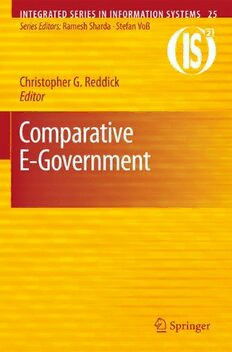Download Comparative E-Government PDF Free - Full Version
Download Comparative E-Government by M. Naveed Baqir, Lakshmi Iyer (auth.), Christopher G. Reddick (eds.) in PDF format completely FREE. No registration required, no payment needed. Get instant access to this valuable resource on PDFdrive.to!
About Comparative E-Government
Comparative E-Government examines the impact of information and communication technology (ICT) on governments throughout the world. It focuses on the adoption of e-government both by comparing different countries, and by focusing on individual countries and the success and challenges that they have faced. With 32 chapters from leading e-government scholars and practitioners from around the world, there is representation of developing and developed countries and their different stages of e-government adoption. Part I compares the adoption of e-government in two or more countries. The purpose of these chapters is to discern the development of e-government by comparing different counties and their individual experiences. Part II provides a more in-depth focus on case studies of e-government adoption in select countries. Part III, the last part of the book, examines emerging innovations and technologies in the adoption of e-government in different countries. Some of the emerging technologies are the new social media movement, the development of e-participation, interoperability, and geographic information systems (GIS). Integrated Series in Information Systems (IS2) strives to publish scholarly work in the technical as well as the organizational side of the field. This series contains three sub-series including: expository and research monographs, integrative handbooks, and edited volumes, focusing on the state-of-the-art of application domains and/or reference disciplines, as related to information systems. In a parallel effort - recognizing that some of the cutting edge research in IS comes from doctoral research - selected dissertations are also published in the monograph section of the series.
Detailed Information
| Author: | M. Naveed Baqir, Lakshmi Iyer (auth.), Christopher G. Reddick (eds.) |
|---|---|
| Publication Year: | 2010 |
| ISBN: | 9781441965363 |
| Pages: | 699 |
| Language: | English |
| File Size: | 5.143 |
| Format: | |
| Price: | FREE |
Safe & Secure Download - No registration required
Why Choose PDFdrive for Your Free Comparative E-Government Download?
- 100% Free: No hidden fees or subscriptions required for one book every day.
- No Registration: Immediate access is available without creating accounts for one book every day.
- Safe and Secure: Clean downloads without malware or viruses
- Multiple Formats: PDF, MOBI, Mpub,... optimized for all devices
- Educational Resource: Supporting knowledge sharing and learning
Frequently Asked Questions
Is it really free to download Comparative E-Government PDF?
Yes, on https://PDFdrive.to you can download Comparative E-Government by M. Naveed Baqir, Lakshmi Iyer (auth.), Christopher G. Reddick (eds.) completely free. We don't require any payment, subscription, or registration to access this PDF file. For 3 books every day.
How can I read Comparative E-Government on my mobile device?
After downloading Comparative E-Government PDF, you can open it with any PDF reader app on your phone or tablet. We recommend using Adobe Acrobat Reader, Apple Books, or Google Play Books for the best reading experience.
Is this the full version of Comparative E-Government?
Yes, this is the complete PDF version of Comparative E-Government by M. Naveed Baqir, Lakshmi Iyer (auth.), Christopher G. Reddick (eds.). You will be able to read the entire content as in the printed version without missing any pages.
Is it legal to download Comparative E-Government PDF for free?
https://PDFdrive.to provides links to free educational resources available online. We do not store any files on our servers. Please be aware of copyright laws in your country before downloading.
The materials shared are intended for research, educational, and personal use in accordance with fair use principles.

